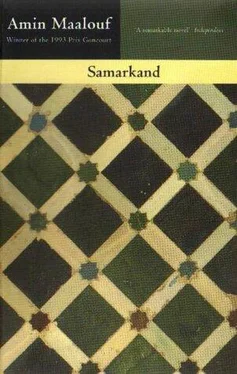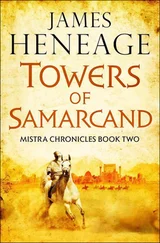‘I have never met a man who has learnt so many things. What do you plan to do with all this accumulation of knowledge?’
Hassan looked at him distrustingly, as if some secret part of his soul had been violated, but he recovered his composure and lowered his eyes.
‘I want to work my way close to Nizam al-Mulk. He may have some position for me.’
Omar was so beguiled by his companion that he was on the point of revealing to him that he himself was on his way to see the Grand Vizir. However, at the last moment, he changed his mind. The last trace of distrust had not yet disappeared.
Two days later, when they had joined a caravan of merchants, they rode side by side, quoting from memory in Persian and Arabic large sections of the most beautiful writings of the authors they admired. Sometimes an argument would start up, but then quickly die down. When Hassan spoke of certainties, raised his voice, proclaimed ‘empirical truths’ and enjoined his companion to admit them, Omar remained sceptical. He slowly weighed the merits of certain opinions but seldom settled for any of them, and willingly displayed his ignorance. He found himself repeating untiringly: ‘What do you want me to say? These things are veiled, and you and I are on the same side of the veil. When it falls, we will no longer be here.’
After a week en route , they arrived in Isfahan.
Esfahan, nesf-é jahan! is what the Persians of today say. ‘Isfahan, half of the world!’ The expression came into use well after the age of Khayyam, but even in 1074 the city was exalted in words: ‘its stones are of galenite, its flies are bees, its grass is saffron’, ‘its air is so pure and healthy that its granaries do not change according to any calendar and flesh does not decompose’. It is true that the city lies at an altitude of five thousand feet, but Isfahan also had sixty caravansarays, two hundred bankers and money-changers and endless covered bazaars. Its workshops produced silk and cotton. Its carpets, cloths and padlocks were exported to the most distant countries. Its roses blossomed in a thousand varieties and its opulence was proverbial. This city, the most populous in the Persian world, attracted all those who were seeking power, fortune or knowledge.
I have said ‘this city’, but one can not really speak of a city. They still tell the story there of a young traveller from Rayy, who was in such a hurry to see the wonders of Isfahan that on the last day he galloped ahead of his caravan. After several hours he came to the bank of the Zayandé-Rud, ‘the life-giving river’, and followed it until he reached a wall of earth. The town seemed to him to be of a respectable size, but smaller than his own city of Rayy. When he reached the gate, he asked the guards.
‘This is the city of Jay,’ he was told.
He did not so much as go in but turned and followed his route toward the West. His mount was exhausted, but he did not spare the crop. Soon he found himself, panting, at the gates of another city, more imposing than the first, but scarcely larger than Rayy. He questioned an old passer-by.
‘This is Yahoudiyeh, the “Jews’ town”.’
‘Are there so many Jews in this country?’
‘There are some, but most of the inhabitants are Muslims, like you and I. The town is called Yahoudiyé because King Nebuchadnezzar is supposed to have settled here the Jews he deported from Jerusalem. Others claim that it was the Jewish spouse of a Persian Shah who, before the age of Islam, had members of her community brought here. God alone knows the truth!’
Our young traveller thus turned away, determined to follow his route even if his horse were to collapse beteen his legs, when the old man called to him:
‘Where are you trying to get to, my son?’
‘To Isfahan!’
The old man burst out laughing.
‘Has no one ever told you that Isfahan does not exist?’
‘What do you mean. Is it not the largest and most beautiful city of Persia? Was it not in the distant past the proud capital of Artaban, King of the Parthians? Have its wonders not been extolled in books?’
‘I do not know what the books say, but I was born here sixty years ago and only foreigners have ever spoken to me of the city of Isfahan. I have never seen it.’
This was hardly any exaggeration. The name Isfahan had for a long time not designated a city but an oasis where there were the two distant cities Jay and Yahoudiyeh, which were separated from each other by an hour’s journey. It was not until the sixteenth century that they, and the surrounding villages, formed a real city. In Khayyam’s day, it did not exist yet, but a wall had been built, three parasangs or twelve miles long, to protect the whole oasis.
Omar and Hassan arrived late in the evening. They found lodgings in Jay, in a caravansary near the Tirah Gate. There they stretched out and before they could exchange a single word they started to snore in unison.
The next day Khayyam went off to see the Grand Vizir. In the Square of the Money-changers, Andalusian, Greek and Chinese travellers and merchants amongst others were milling around the money-changers who, appropriately equipped with their statutory scales, were scratching a Kirman, Nishapur or Seville dinar , sniffing a Delhi tanka , feeling the weight of a Bukhara dirham or pulling a face at a recently devalued nomisma from Constantinople.
The gateway of the diwan , the seat of government and the official residence of Nizam al-Mulk, was not far off. The musicians of the nowba were stationed there to sound their trumpets three times a day in honour of the Grand Vizir. In spite of all this pomp, everyone, down to the most humble widow, was granted permission to venture into the diwan , the huge audience hall, in order to expose their tears and grievances to the strong man of the empire. It was only there that guards and chamberlains made a circle around Nizam, questioned the visitors and sent away the nuisances.
Omar stopped in the doorway. He examined the room, its bare walls and its three layers of carpet. He greeted those present with a hesitant gesture. They were a mixed but contemplative group who surrounded the Vizir, who was in conversation for the time being with a Turkish officer. Out of the corner of his eye, Nizam had spotted the newcomer; he smiled at him in a friendly manner and signalled to him to be seated. Five minutes later he came over to him, and kissed him on both cheeks and then on the forehead.
‘I have been waiting for you. I knew that you would be here on time. I have much to say to you.’
He then led him by the hand away from everyone into a small anti-chamber where they sat down side by side on an enormous leather cushion.
‘Some of what I am about to say will surprise you, but I hope that when all is said and done you will not regret having responded to my invitation.’
‘Could anyone ever regret having entered through Nizam al-Mulk’s gateway.’
‘That has happened,’ murmured the Vizir with a savage smile. ‘I have raised men up to the skies, and I have brought others low. Every day I dispense life and death. God will be the judge of my intentions. He is the source of all power. He granted the supreme authority to the Arab Caliph, who ceded it to the Turkish Sultan, who has delivered it into the hands of the Persian Vizir, your servant. Of others I demand that they respect this authority, but of you, khawajeh Omar, I demand that you respect my dream. Yes, I dream of making this huge country of mine into the most powerful, prosperous, stable state, into the best policed state in the universe. I dream of an empire where every province and city will be administered by a just and God-fearing man who pays heed to the groans of his weakest subjects. I dream of a state where the wolf and the lamb will drink peacefully together, in complete peace, water from the same brook. However, it is not enough for me merely to dream, I am building. Go and walk about in the districts of Isfahan and you will see regiments of workers digging and building, and artisans going about their work. Hospices, mosques, caravansaries, citadels and seats of government are being built everywhere. Soon every important city will have its own large school which will carry my name, a ‘madrasa Nizamiya’ . The one in Baghdad is already in operation. I drew up its plans with my own hands, I established its curriculum, I chose the best teachers for it and I have allotted a grant for every student. You see, this empire is one large building site. It is rising up, expanding and prospering. Heaven has allowed us to live in a blessed age.’
Читать дальше












